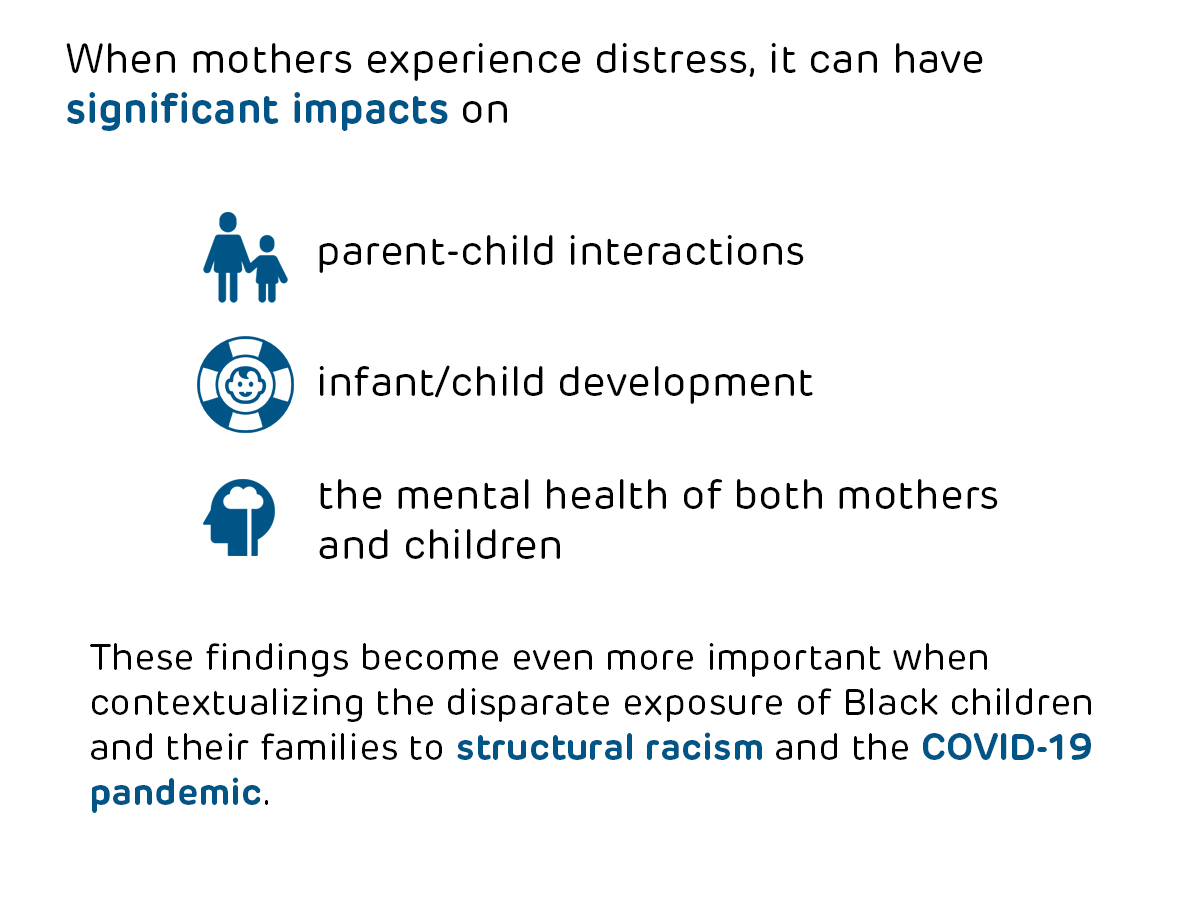Prenatal to Preschool: The Pandemic’s Impact on Mothers and Children, Focusing on Syndemic Effects on Black Families (P2P)
Statement of Problem
The COVID-19 global pandemic has significantly impacted the health and well-being of adults and children alike. In the U.S., the pandemic has highlighted the fractures in many systems including education, the economy, housing, and health care, widening known racial disparities. The fractures in these systems can be acutely felt by young families, which can have long-lasting health effects considering how important the period just after birth is to the neurodevelopment of a child. Research suggests that when mothers experience distress, it can have lasting, negative impacts on parent-child interactions, infant/child development, and the mental health of both women and children. These findings become even more important when contextualizing the disparate exposure of Black children and their families to structural racism (an underlying endemic condition) and the COVID-19 pandemic, which taken together have been defined as a syndemic.
Description
Prenatal to Preschool: The Pandemic’s Impact on Mothers and Children, Focusing on Syndemic Effects on Black Families (P2P)
Prenatal to Preschool: The Pandemic’s Impact on Mothers and Children, Focusing on Syndemic Effects on Black Families (P2P)


Our overarching goal is to deeply characterize the experiences of women and children impacted by the syndemic, filling research gaps that would help us identify specific maternal and environmental factors and mechanisms that critically influence early child development and mental health.
In this video, Dr. Njoroge discusses how this project came to life, the potential impacts of their findings, and what the team hopes to explore next with this dataset.
This multi-methods project consists of three aims, which will longitudinally examine child neurodevelopmental outcomes by early identification of mental health challenges among racially and ethnically diverse mothers.
To identify mothers experiencing distress and psychopathology, we will implement extensive screening of postpartum Black and non-Latinx White (NLW) mothers using a series of questionnaires and clinical psychiatric interviews. This will also help us determine resilience factors and uncover cross-cultural differences that may exist. Fathers or secondary caregivers will complete similar questionnaires, assessing their experiences during the pandemic as well as those of their children and partners.
We will then identify maternal concerns about their child’s development and mental health at two developmental time points (24 and 48 months) and assess mother-child interactions on a series of joint play-based tasks. In our final steps, we will conduct qualitative interviews with a sub-sample of Black women to characterize the impact of the syndemic on their mental health, parenting practices, perceptions of their child’s early development and trust in the health care system.
Our overarching goal is to deeply characterize the experiences of women and children impacted by the syndemic, filling research gaps that would help us identify specific maternal and environmental factors and mechanisms that critically influence early child development and mental health. We also hope the results from this project will allow for future intervention development.
Next Steps
Identifying women disproportionately impacted by the COVID-19 pandemic and endemic conditions during the peripartum period provides an opportunity to understand the developing child’s environment, mother’s mental health and parenting experiences. Our long-term goal is to improve infant and young child neurodevelopmental and mental health outcomes by ensuring appropriate, precise and culturally informed interventions.
This project page was last updated in April 2023.
Suggested Citation
Children's Hospital of Philadelphia, PolicyLab. Pregnancy to Preschool: The Pandemic’s Impact on Mothers and Children, Focusing on Syndemic Effects on Black Families (P2P) [Online]. Available at: http://www.policylab.chop.edu. [Accessed: plug in date accessed here].